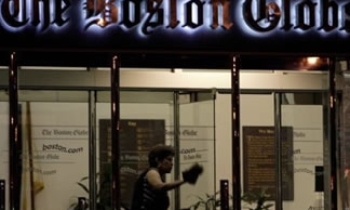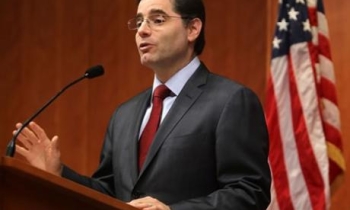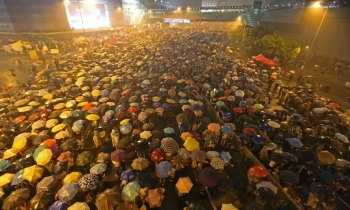Two years ago a scandal involving a rogue reporter called Jayson Blair plunged the New York Times into a crisis that triggered the removal of its editor, his deputy and a painful period of self-examination.
Now the Times faces another scandal involving another favoured reporter and is enduring a similar bout of self-criticism. Some media critics and even Times staff members fear the fall-out could prove more damaging to America's paper of record than the Blair affair.
In theory, the case of Judith Miller, a Pulitzer Prize-winning Times reporter also known as "Miss Run Amok", rests on high principle: the right of journalists to maintain the confidentiality of sources. In practice, however, it has cast light on the murky relationship between an ambitious, hard-driving reporter and an administration bent on "marketing" a war against Iraq to the public.
In the run-up to the Iraq invasion Ms Miller wrote several "scoops" about Saddam Hussein's weapons of mass destruction, often amid protests from colleagues in New York and in Baghdad. After the war her reporting was exposed as deeply flawed but she continued to write on Iraq and WMD, in defiance of orders from Bill Keller, the executive editor of the New York Times.
In June 2003, as criticism of the Bush administration's case for going to war grew in the US, Ms Miller contacted at least one senior White House official to discover why it was proving so hard to find biological, chemical and nuclear weapons in Iraq.
At the time, the CIA was pursuing a similar line of inquiry. Acting on a tip from Dick Cheney, vice-president, it dispatched Joseph Wilson, a former US ambassador, to Niger to investigate whether Iraq was trying to buy uranium. Mr Wilson went public in the New York Times saying there was no such evidence. Shortly afterwards, his wife, Valerie Plame, was identified by a syndicated columnist as an undercover CIA operative.
Prosecutors are now in the final stages of an inquiry into whether senior White House officials, including the president's chief adviser, Karl Rove, leaked Ms Plame's identity to Ms Miller and other journalists as a way of discrediting her husband and intimidating other critics of the war.
Despite the magnitude of the story and a growing chorus of critics the Times largely ignored it for months, apparently in deference to Ms Miller, who spent 85 days in jail, fending off prosecutors' demands for her testimony.
On Sunday the Times finally published a full-page review of Ms Miller's role in the affair. While the paper has won some plaudits for its candour, its revelations have sparked an avalanche of criticism.
"Miller should be promptly dismissed for crimes against journalism and her own paper," urged Greg Mitchell, editor of Editor & Publisher magazine. "And her editor, who has not taken responsibility, should apologise to readers."
In an appearance on the The News Hour, Alex Jones, a Times alumnus who is now director of the Shorenstein Center at Harvard University, said the paper was at "a moral crossroads" and needed to undertake a complete review of Ms Miller's work to restore its credibility.
That may not be easy. Ms Miller declined to share her notes with the Times reporters assigned to recount her saga. The first-person account she published on Sunday has left many questions unanswered. While she admitted, for example, that Lewis "Scooter" Libby, the vice-president's chief of staff, told her that Mr Wilson's wife worked at the CIA on unconventional weapons issues, she claims that she could not remember who disclosed Ms Plame's name. This, despite the fact that the notes from her meeting with Mr Libby include the entry "Valerie Flame."
More broadly, though, the Miller affair has again called into question the Times's editorial oversight. "It's striking that the lessons of their own self-study after Jayson Blair seemed to evaporate," said Jay Rosen, a New York University journalism professor and author of PressThink, a media web-log.
Following that scandal, the Times commissioned an exhaustive study that recommended more scrutiny from editors, better internal communication and the appointment of an ombudsman to publicly review the paper's reports each week publicly.
Journalism students will probably study the glitches in that system for years to come. In the meantime, media critics are already questioning decisions taken at the highest level of the Times's masthead. Arthur Sulzberger, Jr, the Times's publisher, publicly embraced Ms Miller and encouraged the paper's editorial team to write a succession of editorials in her defence, portraying her as a First Amendment hero.
Mr Rosen suspects that Mr Sulzberger's stand was inspired by the paper's conduct during the Pentagon Papers episode in 1971. In one of the Times's finest moments, his father, then the publisher, asserted the free-speech right to publish leaked government documents that revealed the true state of the Vietnam war.
The Times's account of the Miller affair reveals that Mr Sulzberger dedicated the paper to her cause on this lofty principle without bothering first to review her notes or properly examine her dealings with Mr Libby. "This car had her hand on the wheel because she was the one in danger," the publisher explained.
It has now become clear that Ms Miller's hand was the wrong one to have at the wheel of the most prestigious US newspaper at such a crucial moment.









